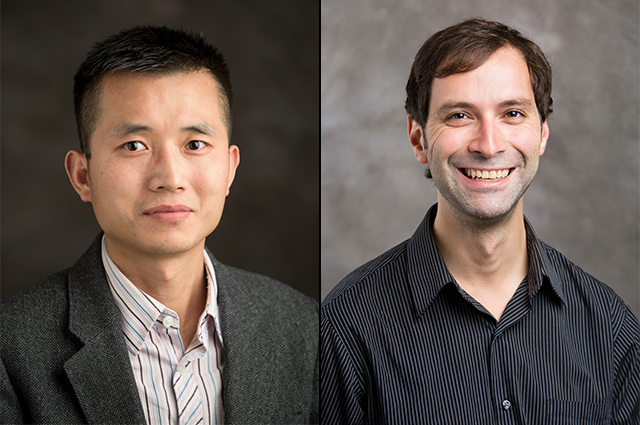Tufts faculty receive NSF CAREER Awards

Assistant Professors Liping Liu and Jivko Sinapov, both of the Department of Computer Science at Tufts University, recently won CAREER Awards from the National Science Foundation (NSF). This prestigious grant award supports early career faculty who show promise of making significant contributions to their field and becoming academic role models as they advance in their career.
Liu’s award funds his research in developing graph generative models. These graphs can represent both micro-level concepts, such as the bonds between atoms as they form molecules, or macro-level concepts like the connections within a social network. The versatility of these models gives his project a wide-reaching impact in areas including drug design, data sharing, and more. Liu’s method utilizes discrete sequential processes and has three main goals: developing a probabilistic framework to create graphing models with neural networks, improving efficiency in model training and model predictions, and deepening understanding of network data. Liu has prioritized protecting private user information while generating graphs.
Liu joined Tufts as a visiting assistant professor in 2017. He held the Schwartz Family Faculty Development Professorship in Computer Science from 2017-2022. Liu earned his PhD from Oregon State University, and his research focuses on machine learning, specifically probabilistic modeling, and graph learning. His research and teaching are outlined on his research webpage.
Sinapov’s project focuses on advancing assistive technology and robotics. Instead of each new robot learning information about an object, such as its size, softness, and movement, from scratch, Sinapov proposes a shared embedding space for robots to collectively input their acquired knowledge about objects. For example, to learn that a new object is ‘soft’, a robot may evaluate haptic readings when it presses on an object. It then catalogues that information for future interactions with that object. But without a way to share that information, each new robot will need to complete the same information-gathering tasks. Sinapov’s method gives new robots the advantage of the previous robots’ multisensory object knowledge, which will help them adapt to tasks more efficiently. Ultimately the project holds promise for robots in assistive technology and manufacturing to reduce information-gathering tasks and share information about object properties with one another.
Sinapov earned his PhD in computer science and human-computer interaction from Iowa State University. He joined Tufts in 2017 and held the James Schmolze Professorship in Computer Science from 2017-2022. His research interests include developmental robotics, computational perception, autonomous manipulation, and human-robot interaction. At Tufts, he leads the Multimodal Learning, Interaction and Perception (MuLIP) lab"
As human-robot collaboration and the need to continuously graph complex models while maintaining user privacy become increasingly important, these CAREER Awards demonstrate the innovative research being conducted at the School of Engineering and faculty members’ exceptional forward-thinking work.
Learn more about Assistant Professor Liping Liu’s research.
Learn more about Assistant Professor Jivko Sinapov’s research.
The content of this article is solely the responsibility of the authors and does not necessarily represent the official views of the National Science Foundation. Research reported in this article was supported by the National Science Foundation, under the following award numbers:
- 2239869
- 2239764
Department:
Computer Science